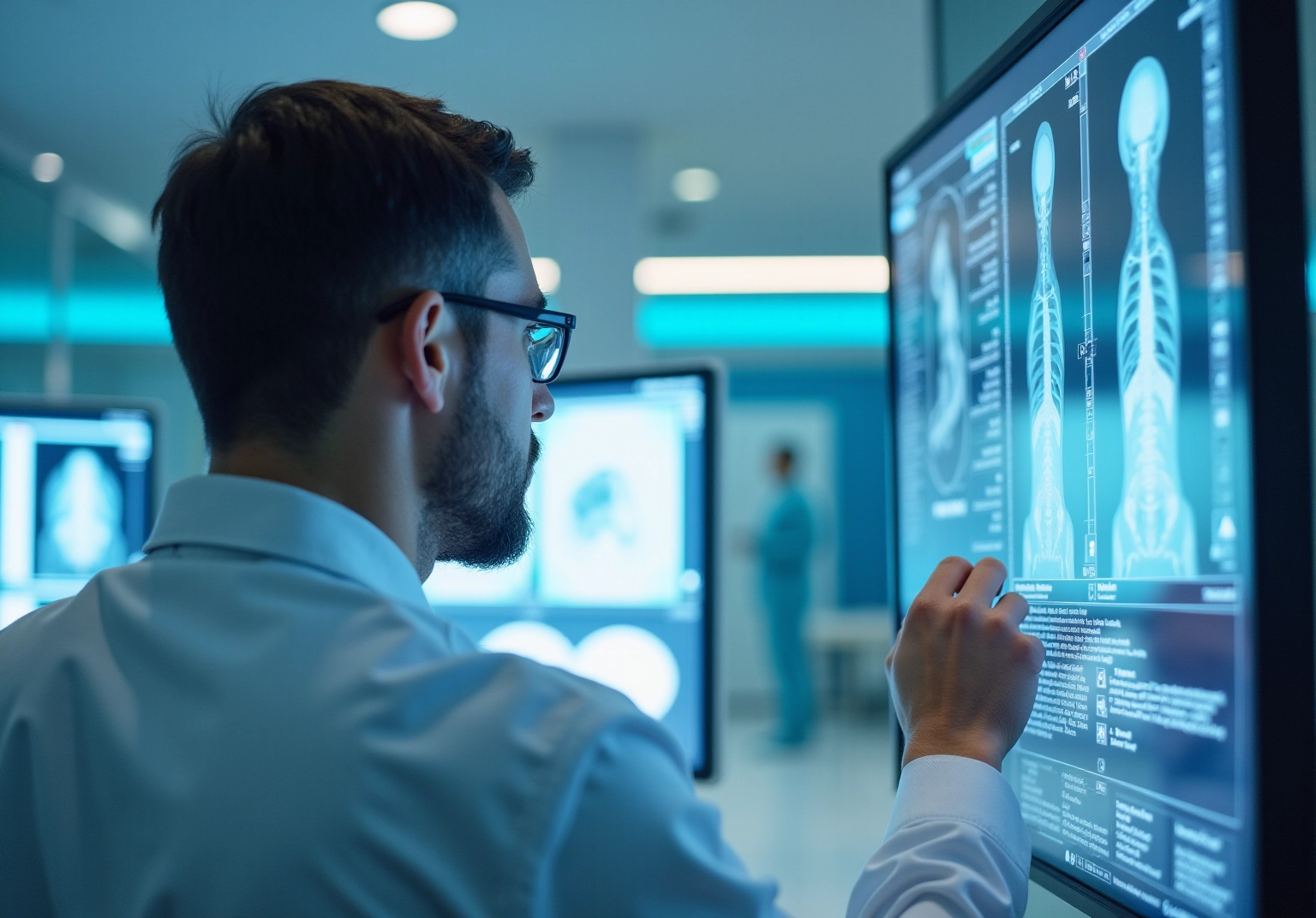
The article delineates seven pivotal advantages of artificial intelligence (AI) in healthcare, highlighting:
These advantages are substantiated by an array of examples and statistics that illustrate how AI technologies optimize operational workflows, elevate patient outcomes, and curtail expenses. This evidence underscores AI’s transformative impact on the healthcare sector, establishing its critical role in addressing contemporary challenges.
The healthcare sector is experiencing a significant transformation, propelled by the integration of artificial intelligence (AI) technologies that promise to enhance efficiency and improve patient outcomes. As the demand for precise diagnostics, personalized care, and cost-effective solutions escalates, the advantages of AI in healthcare become increasingly clear.
Nevertheless, the path toward fully realizing these benefits is fraught with challenges, raising critical questions about implementation and ethical considerations.
The Inferscience HCC Assistant employs advanced AI algorithms to streamline the HCC coding process. By conducting a thorough gap analysis on claims files, it identifies and suggests HCC codes that may have been overlooked, ensuring comprehensive code submission. This real-time analysis not only reduces the administrative burden on coders but also significantly improves coding accuracy—a critical factor for compliance with Medicare Advantage requirements.
Additionally, the seamless integration of the HCC Assistant within electronic health records (EHRs) consolidates individual information, optimizing workflows and enhancing funding opportunities for service providers. Impressively, the advantages of AI in healthcare are demonstrated as AI-driven solutions have tripled clinical review productivity, achieving over 95% accuracy in identifying hierarchical condition codes (HCCs).
As healthcare providers encounter escalating demands for precise coding, the HCC Assistant emerges as an indispensable tool that showcases the advantages of AI in healthcare for navigating the intricacies of HCC coding, ensuring both efficiency and compliance.
Request a Demo.

AI technologies are fundamentally transforming diagnostic processes by leveraging extensive medical data to uncover patterns and anomalies, demonstrating the advantages of AI in healthcare that are often overlooked by human clinicians. This transformation addresses a critical challenge in healthcare, which illustrates the advantages of AI in healthcare: the need for accurate and timely diagnoses. For instance, the advantages of AI in healthcare include the remarkable effectiveness of AI algorithms in identifying early indicators of diseases, which enables timely interventions that can greatly enhance outcomes for individuals. Recent studies indicate that the advantages of AI in healthcare include enhancing diagnostic accuracy by reducing false positives and negatives, with some algorithms achieving accuracy rates that match or exceed those of expert radiologists. The advantages of AI in healthcare include increased accuracy, which not only enhances the quality of healthcare but also reduces the financial burdens associated with late-stage disease management.
The advantages of AI in healthcare, particularly its predictive analytics abilities, allow medical providers to recognize possible health problems early, paving the way for personalized treatment plans that address individual patient needs. As medical services continue to evolve, the advantages of AI in healthcare will play a vital role in promoting a more efficient and effective medical system. The integration of these advanced technologies showcases the advantages of AI in healthcare, representing a necessary evolution that will define the future of the industry.

One of the advantages of AI in healthcare is that AI-driven predictive analytics are essential in significantly lowering operational costs within medical environments. By leveraging historical data, these sophisticated systems can accurately forecast patient admissions, optimize staffing levels, and manage inventory with remarkable precision, highlighting the advantages of AI in healthcare. This proactive approach demonstrates the advantages of AI in healthcare by enabling medical organizations to allocate resources effectively, yielding substantial cost savings.
For example, predictive models allow hospitals to foresee peak periods, ensuring sufficient staffing and minimizing overtime expenses. Moreover, efficient medical database management systems promote seamless information exchange across departments, enhancing the accuracy of data utilized in predictive analytics.
Research indicates that the advantages of AI in healthcare, such as implementing predictive analytics in hospitals, can lead to lower readmission rates and reduced lengths of stay for patients, further bolstering financial performance. As medical leaders increasingly adopt these technologies, the potential for operational cost reduction emerges as a critical factor for improved care and resource management.
The advantages of AI in healthcare enable professionals to devise customized treatment strategies through meticulous analysis of individual data, including genetic information, medical history, and lifestyle factors. This tailored approach not only heightens user involvement but also markedly enhances treatment effectiveness.
For example, AI can propose specific therapies tailored to an individual’s unique profile, resulting in improved health outcomes and greater satisfaction.
As of 2023, the global AI in healthcare engagement market was valued at USD 6.08 billion, with projections indicating it will soar to USD 23.1 billion by 2030, reflecting a compound annual growth rate (CAGR) of 21.2%. Such growth underscores the increasing reliance on AI technologies to elevate individualized support and enrich overall experiences, reflecting the advantages of AI in healthcare.
The advantages of AI in healthcare are evident as AI solutions revolutionize the automation of various administrative tasks, including appointment scheduling, billing, and documentation. This transformation significantly reduces the time medical professionals spend on routine tasks, demonstrating the advantages of AI in healthcare by allowing them to concentrate more on individual well-being.
For instance, Inferscience’s Care Gaps app empowers providers to upload a list of care gaps, automatically analyze the information, and review suggested gaps within their EHR. Such a streamlined process enhances healthcare provider workflow and ensures that essential needs are addressed efficiently.
Moreover, AI-driven chatbots adeptly manage user inquiries and appointment scheduling, enabling staff to devote their efforts to more intricate duties. This shift not only boosts operational efficiency but also elevates the overall patient experience.
Statistics reveal that approximately 40% of medical administrative tasks are automatable, with around 43% of tasks in payer organizations and 33% in provider organizations also suitable for automation. This presents substantial advantages of AI in healthcare, leading to cost savings and improved efficiency. Furthermore, automation could save the medical industry about $150 billion annually through operational enhancements.
As AI continues to evolve, the advantages of AI in healthcare will expand its role in streamlining operations and enriching patient interactions, making it an essential component of modern medical administration. However, public perception indicates that many Americans are uncomfortable with AI reliance in healthcare, underscoring the necessity for careful implementation.
As noted by a leading researcher, ‘AI is transforming diagnostics, offering unprecedented accuracy and speed.

The advantages of AI in healthcare are evident as AI technologies revolutionize medical imaging, significantly enhancing the speed and accuracy of image analysis. Advanced algorithms swiftly process and interpret complex imaging data, facilitating the identification of abnormalities that human radiologists might overlook.
For example, AI systems have demonstrated remarkable effectiveness in detecting tumors in mammograms and recognizing fractures in X-rays. This not only accelerates the diagnostic process but also demonstrates the advantages of AI in healthcare by elevating overall patient care.
Furthermore, this technological advancement showcases the advantages of AI in healthcare by enhancing diagnostic capabilities and alleviating the workload on radiologists, allowing them to focus more on patient interactions and complex cases.

Incorporating AI with electronic health records (EHRs) addresses a significant challenge in individual information management. The integration of AI in healthcare is transforming the industry by:
Inferscience’s API solution effectively tackles the complexities of healthcare interoperability, enabling seamless HCC coding information exchange among providers, payers, and third-party vendors. This extensive access to individual information not only promotes more informed choices but also enhances health outcomes.
Furthermore, the Claims Assistant performs real-time gap analysis on claims files, recommending HCC codes that may have been overlooked. This ensures precise billing and provides a clearer perspective on individual conditions. The API delivers analysis in JSON format, facilitating quick retrieval of insights. The advantages of AI in healthcare are evident as algorithms analyze medical data in real-time, equipping clinicians with actionable insights that inform treatment decisions.
This integration streamlines workflows and guarantees that providers have access to comprehensive and current information about individuals, ultimately enhancing the quality of care. By leveraging these advanced technologies, healthcare organizations can significantly improve their operational efficiency and patient outcomes, showcasing the advantages of AI in healthcare.

AI is fundamentally transforming drug discovery, highlighting the advantages of AI in healthcare by enhancing the identification of potential drug candidates and streamlining clinical trial processes. By leveraging machine learning algorithms, vast datasets can be analyzed, predicting interactions between compounds and biological systems with over 90% accuracy. This capability significantly reduces the time and costs associated with traditional drug development methods, showcasing the advantages of AI in healthcare.
Remarkably, AI can identify promising drug candidates up to ten times faster than conventional approaches, resulting in clinical trials that are expedited by as much as 40%. Consequently, new treatments can reach the market more efficiently, with the average time to market projected to decrease from 12-15 years to just 7-10 years. Furthermore, the advantages of AI in healthcare have demonstrated the potential to cut overall trial costs by up to 25%, making the drug development process not only faster but also more cost-effective.
Additionally, the advantages of AI in healthcare include AI-based toxicity prediction models that can reduce adverse drug reactions by 30-40%, thereby enhancing patient safety. Case studies highlight that AI-discovered molecules have achieved an impressive 80-90% success rate in Phase I trials, significantly surpassing historical averages. The global AI in drug discovery market is projected to reach $5.1 billion by 2027, growing at a CAGR of 40%. This innovative approach not only accelerates the discovery of life-saving treatments but also optimizes resource allocation, ensuring that pharmaceutical companies can respond swiftly to urgent health needs.
The incorporation of AI in medical services showcases the advantages of AI in healthcare, but it is also accompanied by challenges that can hinder successful implementation. Key issues include:
Notably, 62% of workers report feeling unprepared with AI skills, underscoring the critical need for tailored training programs to bridge this gap. Additionally, medical organizations must navigate regulatory compliance while ensuring that AI systems are user-friendly and efficient.
Inferscience’s advanced database management solutions are pivotal in addressing these challenges by ensuring that information is accurately stored, coordinated, and accessed. This approach not only enhances efficiency but also supports adherence to medical regulations. By leveraging Inferscience’s AI-powered tools, such as automated reporting and data cross-referencing, organizations can:
This highlights the advantages of AI in healthcare. To effectively navigate the complexities of AI integration, organizations should formulate clear, strategic plans that prioritize collaboration across departments and actively involve stakeholders in the implementation process. By proactively tackling these challenges and utilizing Inferscience’s specific features, medical service providers can facilitate smoother transitions and fully harness the advantages of AI in healthcare.

As AI technologies gain traction in healthcare, the advantages of AI in healthcare make the imperative for ethical compliance more critical than ever. Healthcare organizations must develop comprehensive guidelines for the responsible use of AI, with a focus on pivotal issues such as:
Addressing AI bias is vital, as it significantly impacts healthcare outcomes; rectifying biases in AI algorithms could enhance the identification of Black individuals needing additional assistance from 17.7% to 46.5%. Furthermore, recognizing service gaps—instances where individuals have not undergone recommended checks or screenings—underscores the importance of accurate data and records in improving outcomes for patients.
Shortfalls in support often stem from resource shortages and limited access to information. The advantages of AI in healthcare can alleviate these challenges by providing timely insights and reminders to healthcare providers. Establishing robust ethical frameworks can mitigate risks associated with AI deployment, ensuring that these technologies enhance healthcare while upholding ethical standards. This commitment to ethical compliance not only safeguards patients but also cultivates trust in AI-driven medical solutions, a necessity given that 86% of Americans express concerns regarding the transparency of AI-generated information.
By prioritizing ethical practices and addressing care gaps, healthcare organizations can adeptly navigate the complexities of AI integration, thereby leveraging the advantages of AI in healthcare to foster a more equitable healthcare environment.
The integration of artificial intelligence in healthcare is not merely a trend; it is a transformative force reshaping the landscape of medical services. This evolution presents numerous advantages that enhance efficiency and improve patient outcomes. By leveraging AI technologies, healthcare providers can streamline processes, improve diagnostic accuracy, reduce operational costs, and deliver personalized care. The compelling benefits of AI address current challenges and pave the way for a more effective healthcare system.
Key insights throughout the article illustrate how AI-powered solutions, such as the Inferscience HCC Assistant, enhance coding accuracy and administrative efficiency. The capability of AI to analyze vast datasets allows for earlier disease detection and tailored treatment plans, ultimately leading to better health outcomes. Moreover, the role of AI in predictive analytics significantly reduces costs and optimizes resource management, while advancements in medical imaging and drug discovery accelerate the development of innovative treatments.
As the healthcare industry continues to evolve, embracing AI technologies is vital for ensuring that patients receive the highest quality of care. Stakeholders must prioritize ethical considerations and navigate implementation challenges to fully harness the potential of AI. By committing to responsible practices and fostering collaboration across departments, healthcare organizations can create a more equitable and efficient system that ultimately benefits all. The advantages of AI in healthcare represent a necessary evolution that will define the future of medical practice.